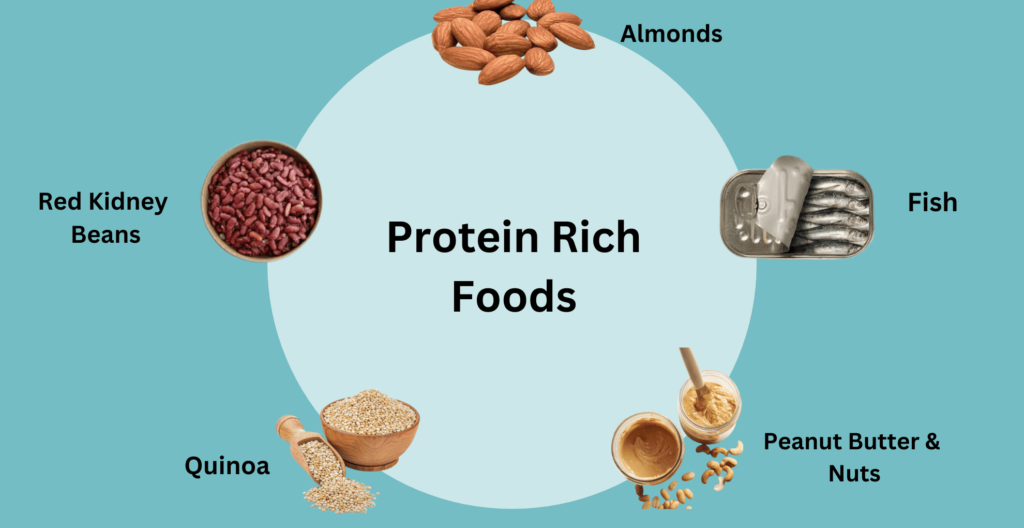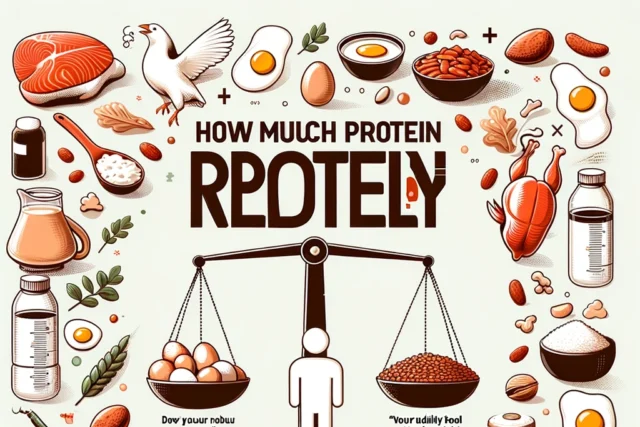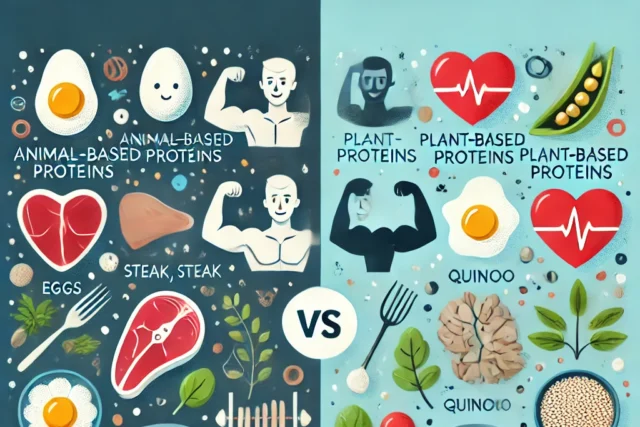Introduction
Proteins—it’s the one macronutrient we constantly hear about, whether in fitness circles, dieting advice, or general health tips. But have you ever stopped to wonder exactly how much protein do you really need every day? Some swear by high-protein diets for muscle gain or weight loss, while others argue that you can overdo it. Understanding your protein requirements can make a huge difference in how you feel, perform, and even look. Let’s dive into the science and discover the right amount of protein you should be consuming.
Table of Contents
What is Protein and Why is it Important?
Protein is a fundamental building block of life. Every cell in your body contains it. From muscle growth to hair, skin, and nails, protein is essential. It’s also crucial for producing enzymes and hormones that regulate many processes in the body. Essentially, without enough protein, your body wouldn’t function properly.
There are two main types of protein: animal-based (meat, eggs, dairy) and plant-based (beans, tofu, quinoa). Both can provide all the essential amino acids, but animal proteins tend to be more “complete,” meaning they contain all the amino acids your body can’t make on its own.
How Does the Body Use Proteins?
Protein is vital for numerous functions in the body, beyond just building muscle. It is involved in muscle repair, growth, and the production of enzymes and hormones that keep your body functioning smoothly. Here’s a breakdown of its key roles:
Protein’s Role in Muscle Repair and Growth
When you engage in physical activities, especially resistance exercises like weightlifting, your muscles endure microscopic tears. Protein helps repair and rebuild these muscle fibers, making them stronger and larger over time. This process, known as muscle protein synthesis, relies heavily on the intake of amino acids, which are the building blocks of protein.
Adequate protein intake ensures that your muscles have the raw materials they need to recover after workouts. Without enough protein, muscle repair slows down, and muscle mass may even decrease, especially during periods of intense training or aging.
Protein’s Role in Enzyme and Hormone Production
Proteins are not just important for muscle; they are also crucial for the production of enzymes and hormones. Enzymes are proteins that act as catalysts for various chemical reactions in the body, such as digestion and energy production. Hormones like insulin, which regulates blood sugar, and growth hormone, which is essential for development and tissue repair, are also proteins or depend on proteins for their production.
Without enough protein in your diet, your body may struggle to produce these important molecules, leading to issues with metabolism, growth, and overall health.
Daily Protein Requirements: General Guidelines

The Recommended Daily Allowance (RDA) for protein is about 0.8 grams per kilogram of body weight. For The amount of protein you need each day varies depending on several factors such as age, gender, and physical activity levels. However, there are some general guidelines that can help you determine your baseline needs.
Recommended Daily Allowance (RDA) for Protein
The Recommended Daily Allowance (RDA) for protein is 0.8 grams per kilogram of body weight for most adults. This means that, on average:
- A sedentary woman weighing 68 kg (150 lbs) would need about 54 grams of protein per day.
- A sedentary man weighing 80 kg (176 lbs) would need about 64 grams of protein per day.
This RDA is based on the minimum amount of protein required to avoid deficiency and maintain basic bodily functions. However, it may not be sufficient for everyone, particularly those who are more active or have specific health goals.
Variability Based on Age and Gender
Older adults may benefit from higher protein intake to prevent muscle loss (sarcopenia). Experts recommend up to 1.0–1.2 g/kg per day for those over the age of 65.
Children and teenagers need more protein relative to their body weight than adults because they are still growing. The RDA for children ages 4–13 is about 0.95 g/kg.
Pregnant and breastfeeding women require additional protein to support the growth and development of the baby. They may need an additional 25 grams of protein per day.
Proteins Need for Different Activity Levels
Your protein needs increase if you’re physically active. The more you move and work out, the more protein your body requires for recovery, muscle repair, and energy.
Sedentary Individuals
For sedentary individuals, or those with minimal physical activity, the RDA of 0.8 grams per kilogram of body weight is typically sufficient. Since they aren’t putting much strain on their muscles, they don’t require additional protein to repair or grow muscle tissue.
Active Individuals (Light and Moderate Exercise)
People who engage in light to moderate physical activity, such as casual jogging, cycling, or yoga, require slightly more protein than sedentary individuals. These activities place mild stress on muscles, so an intake of about 1.0–1.2 grams per kilogram of body weight is recommended.
For example, if you weigh 70 kg (154 lbs) and engage in moderate exercise a few times a week, you should aim for around 70–84 grams of protein daily.
Athletes and Bodybuilders
If you’re a serious athlete, bodybuilder, or someone who trains intensely multiple times per week, your protein needs are even higher. This is because intense physical activity leads to more muscle breakdown, and a greater amount of protein is needed to repair and build those muscles back stronger.
For athletes and bodybuilders, the recommended proteins intake is between 1.6–2.2 grams per kilogram of body weight. This higher intake supports not just muscle repair, but also increased energy demands and overall muscle growth.
For instance, an 80 kg (176 lb) athlete aiming to build muscle may need between 128–176 grams of protein per day.
Protein Requirements for Different Life Stages
Protein needs aren’t static throughout life:
- Children and teenagers require more protein relative to their body size, as they are growing rapidly.
- Adults typically follow the general guidelines unless they are very active.
- Seniors often need more protein than younger adults to help prevent muscle loss (sarcopenia) that comes with aging. Experts recommend older adults consume around 1.0-1.2 g/kg of protein per day.
How Much Proteins Do You Need to Build Muscle?
If you’re trying to build muscle, protein is your best friend. The typical recommendation for those aiming to gain muscle is 1.6-2.2 grams of protein per kilogram of body weight. Proteins timing also matter; consuming protein-rich meals throughout the day and a post-workout snack can maximize muscle repair and growth.
Proteins for Weight Loss: How It Helps

Proteins can play a major role in weight loss by boosting metabolism, reducing appetite, and preserving muscle mass. Higher protein diets tend to keep you fuller for longer, curbing the need to snack or overeat. Plus, since the body uses more energy to digest protein (a process called the thermic effect of food), eating more of it can actually help you burn calories.
Protein for Maintaining Overall Health
Beyond muscle and weight, protein is essential for overall health:
- Bone health: Research suggests adequate protein intake can improve bone density and reduce the risk of osteoporosis, especially in older adults.
- Skin, hair, and nails: Proteins like collagen and keratin are critical for maintaining healthy skin, hair, and nails, keeping them strong and vibrant.
Signs You’re Not Getting Enough Protein
If you’re not eating enough protein, your body will send out some warning signals, such as:
- Muscle weakness or loss
- Fatigue or sluggishness
- Brittle hair and nails
- Swollen joints
- Increased infections due to weakened immunity
Over time, proteins deficiency can lead to more severe health problems like muscle wasting and impaired organ function.
Can You Have Too Much Protein?
While proteins are essential, there is such a thing as too much. Consuming excessive amounts of protein, especially from animal sources, can strain the kidneys and may increase the risk of certain health issues like heart disease. However, fears about high-protein diets causing kidney damage are mostly relevant to individuals with pre-existing kidney conditions.
How to Calculate Your Personal Protein Needs
Calculating how much proteins you need starts with knowing your body weight and activity level. Here’s a quick formula:
- Multiply your body weight in kilograms by 0.8 (for sedentary) or up to 2.2 (for athletes).
- Adjust for special situations like pregnancy or recovery from illness, where protein needs may increase.
For example, a 70 kg (154 lb) moderately active person would need around 70-84 grams of proteins daily.
Best Sources of Protein

Not all protein sources are created equal. Here’s a breakdown:
- Animal-based: Eggs, chicken, beef, fish, and dairy are excellent complete proteins. They’re packed with all essential amino acids.
- Plant-based: Lentils, beans, tofu, quinoa, and nuts are great options, but vegetarians and vegans may need to combine different foods to meet their amino acid needs.
Protein supplements like whey or plant-based powders are also useful if you’re struggling to meet your daily intake.
How to Distribute Protein Throughout the Day
It’s not just how much proteins you eat; it’s also when you eat it. Distributing protein evenly across meals ensures your body gets a steady supply of amino acids throughout the day. For example, aim for about 20-30 grams of protein per meal, and include high-protein snacks like Greek yogurt or nuts.
Frequently Asked Questions
How much protein do I need if I’m trying to lose weight?
Aim for 1.2-1.6 grams of protein per kilogram of body weight to help preserve muscle while losing fat.
Can you get enough protein on a vegan or vegetarian diet?
Yes, with careful planning. Include diverse plant-based sources like beans, tofu, lentils, and quinoa.
Is protein timing important for muscle growth?
Yes, spreading protein intake throughout the day and consuming it after workouts can help maximize muscle synthesis.
What are the best high-protein snacks?
Greek yogurt, boiled eggs, cottage cheese, and nuts are all excellent high-protein snacks.
Should protein intake differ between men and women?
In general, men require more protein due to larger muscle mass, but individual needs should be based on weight and activity level rather than gender alone.
Conclusion
Protein is a key nutrient that plays a central role in every aspect of your health—from building muscle and maintaining bone strength to supporting weight loss and overall wellness. While general guidelines exist, your ideal protein intake depends on your unique lifestyle, activity level, and health goals. So next time you’re planning a meal, don’t just count calories—make sure you’re getting enough protein!



MOST COMMENTED
Animal-Based Proteins / Casein Protein / Dietary Protein / High-Protein Diets / Pea Protein / Plant-Based Proteins / Protein / Protein Deficiency / Protein Supplements / Proteins / Whey Protein / Whey Proteins
Pea Proteins: The Best Plant-Based Protein Alternative?
Foot Problem / Foot Health
Revolutionize Your Recovery: Natural Remedies for Plantar Fasciitis – Fresh Home Keepers
Dietary Supplement
Revitalize Your Health: The Magic of Red Yeast Rice Capsules
Exercises and Footwear Tips for Hammertoe Relief / Foot care / Foot Health / Foot Pain / Foot Problem / Hammertoes
Unlock Effective Exercises and Footwear Tips for Hammertoe Relief
Hammertoes / Foot Health / Foot Pain / Foot Problem
Unlock Relief: Essential Guide to Hammertoes Causes, Symptoms, and Treatments
Moringa Powder / Moringa Supplement
Green Superfood: The Ultimate Guide to Moringa Leaf Powder
Moringa Powder
Supercharge Your Diet: The Incredible Impact of Moringa Leaf Powder
Animal-Based Proteins / Casein Protein / Dietary Protein / High-Protein Diets / Pea Protein / Plant-Based Proteins / Protein / Protein Deficiency / Protein Supplements / Proteins / Whey Protein / Whey Proteins
Is Protein Powder Safe for Teenagers and Children?
Animal-Based Proteins / Casein Protein / Dietary Protein / High-Protein Diets / Pea Protein / Plant-Based Proteins / Protein / Protein Deficiency / Protein Supplements / Proteins / Whey Protein / Whey Proteins
Unlock the Power of Proteins for Optimal Gut Health
Shin Splints / Foot Health / Foot Problem
Unlock Relief: Essential Guide to Overcoming Shin Splints – Discover Healing Strategies